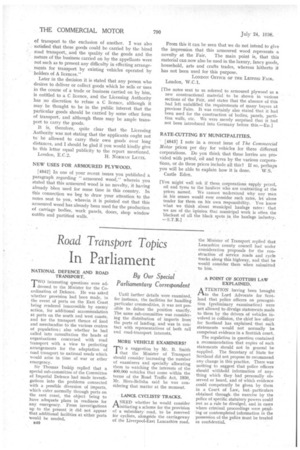Road Transport Topics
Page 54

If you've noticed an error in this article please click here to report it so we can fix it.
In Parliament
By Our Special Parliamentary Correspondent
NATIONAL DEFENCE AND ROAD TRANSPORT.
TWO interesting questions were addressed to the Minister for the Coordination of Defence. He was asked whether provision had been made, in the event of ports on the East Coast being rendered inaccessible by enemy action, for additional accommodation at ports on the south and west coasts, and for the transport thence of food and merchandise to the various centres of population ; also whether he had called into consultation the heads of organizations concerned with road transport with a view to perfecting arrangements for the adaptation of road transport to national needs which would arise in time of war or other emergency.
Sir Thomas Inskip replied that a special sub-committee of the Committee of Imperial Defence had made investigations into the problems connected with a possible diversion of imports, which enter normally through ports on the east coast, the object being to have adequate plans in readiness for any emergency. From investigations up to the present it did not appear that additional facilities at either ports would be needed.
B40 Until further details were examined, for instance, the facilities for handling particular commodities, it was not possible to define the position exactly. The same sub-committee was considering the distribution of imports from the ports of landing, and was in contact with representatives of both rail and road-transport interests.
MORE VEHICLE EXAMINERS?
T'a suggestion by Mr. . Smith -:that Bthe Minister of Transport should consider increasing the number of examiners and specially allocating them to watching the interests of the 400,000 vehicles that come within the terms of the Road Traffic Act, 1930, Mr. Hore-Belisha said he was considering that matter at the moment.
LANCS. CYCLISTS"TRACKS.
ASKED whether he would consider initiating a scheme for the provision of a subsidiary road, to be reserved for cyclists, alongside the carriageway of the Liverpool-East Lancashire road,
the Minister of Transport replied that Lancashire county council had under consideration proposals for the construction of service roads and cycle tracks along this highway, and that he would consider them when submitted to him.
A POINT OF SCOTTISH LAW EXPLAINED.
ATTENTION having been brought to the Lord Advocate for Scotland that police officers on precognition (preliminary examination) were not allowed to divulge statements made to them by the drivers of vehicles involved in collision, the chief law officer for Scotland has explained that such statements would not normally be competent evidence in a Scottish court.
The regulation in question contained a recommendation that copies of such statements should not in general he supplied. The Secretary of State for Scotland did not propose to recommend any change in this practice. There was nothing to suggest that police officers should withhold information of anything which they had personally observed or heard, and of which evidence could competently be given by them in a Court of Law, but particulars obtained throughthe exercise by the police of specific statutory powers could not as a rule be divulged, and in cases where criminal proceedings were pending or contemplated information in the possession of the police must be treated as confidential.




























































































